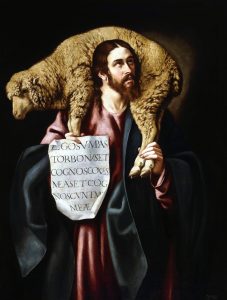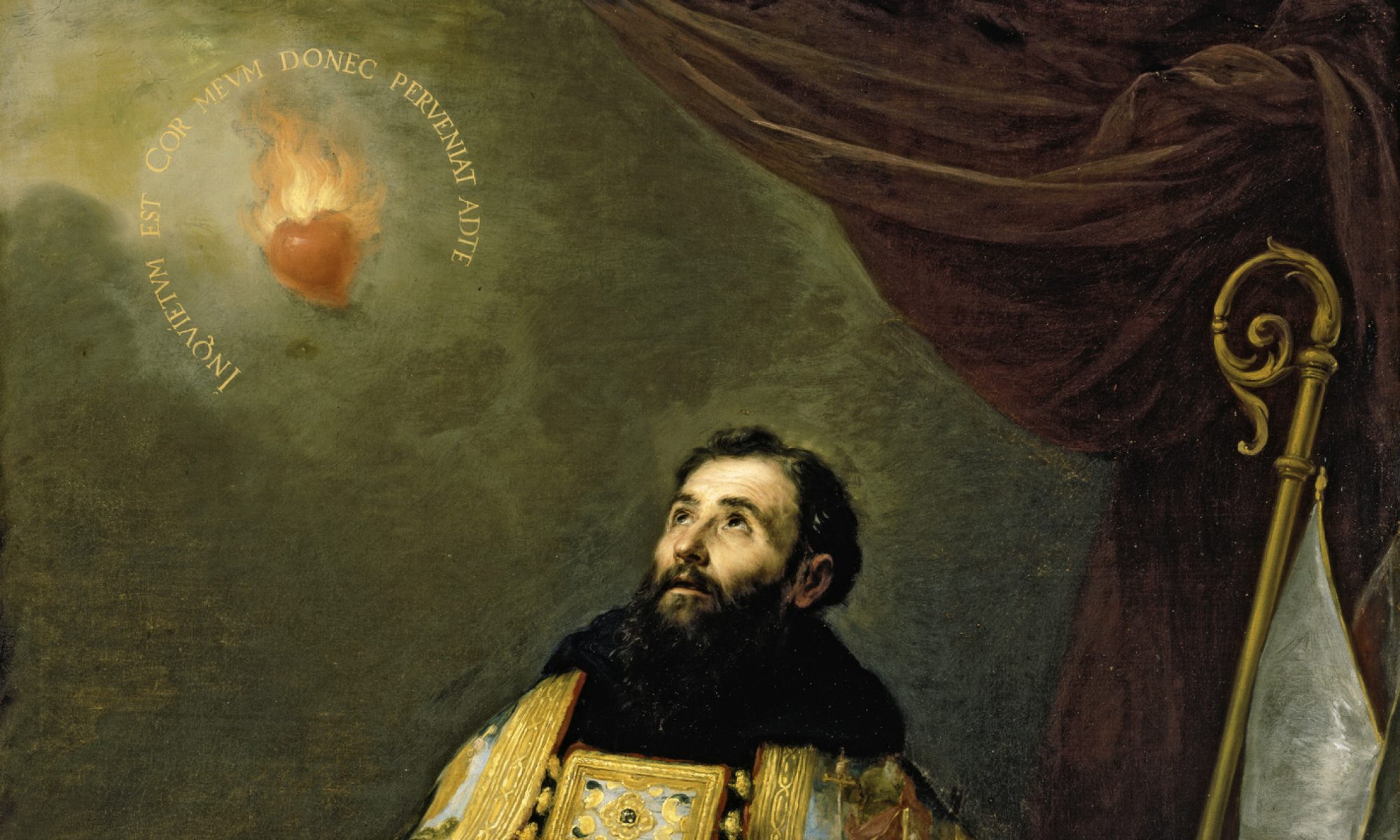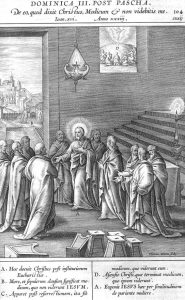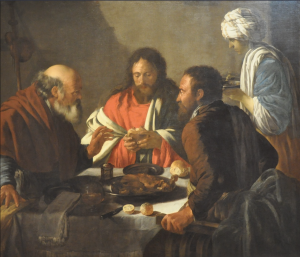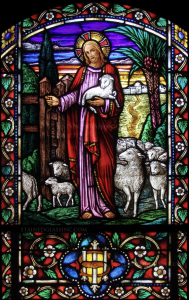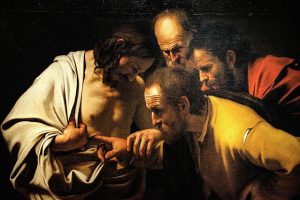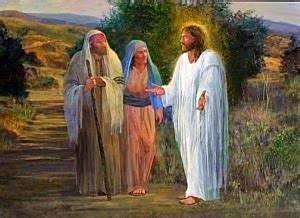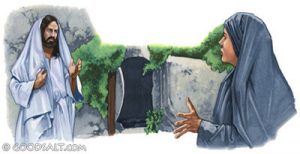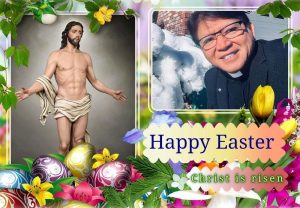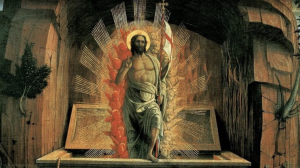I am grateful to God for the successful religious pilgrimage in Lourdes, France revisiting one of the most famous world Marian apparition sites. This is my second time around to be at the grotto where Mother Mary’s apparition to St. Bernadette speaks to me profoundly my priestly calling to devote my time spreading the message of reparation, renewal and praying for the conversion of the world under the guidance and maternal help of our Immaculate Conception. St. Bernadette is a young village girl who was chosen by the Blessed Mother to announce her messages to the world. I was delighted to know that we were born on the same day, on January 7th. I was able to celebrate mass with 84 pilgrims from USA and I drank the miraculous water from that same grotto believed to have extraordinary healing effect.
Then after Lourdes, France we flew to the Holy Land. We went first to Mother Mary for her protection for the whole period of our pilgrimage. The Holy Land is totally new to me. It was emotional to be in the land where historic Jesus fulfilled the scriptures as the Messiah prophesied in the Old Testament and where He lived, preached, then offered the most loving sacrificed for the salvation of the world. Seeing and visiting those important places connected to His life, I have been renewed, strengthen my faith and brought me healing. I have offered prayers for those numerous friends who have asked me to pray for them. May those prayers I have offered help them resolve their weary heart and fill them with His abundant blessings.
Today is Good Shepherd Sunday where we are invited to look at Jesus as our Shepherd who watches and cares for us.
There are qualities which we know Jesus has fulfilled being a faithful and Good Shepherd.
First, He works hard even putting Himself in an extremely difficult task to secure all of us from all kinds of danger. I can only imagine being a shepherd who travels with the sheep as he finds fertile fields for their food; he leads them to those pastures and watches over them as they are being nourished.
Second, as our eternal shepherd, who literally laid down His life for his sheep by caring for us 24-7. At night a new demand, he puts on great responsibility of his flock. He finds a place safe for sleeping. But even then oftentimes the shepherd couldn’t just sleep because he needs to be attentive to the sheep even at his time of rest. He needs to be vigilant for the sake if his flock.
Third, as a sheep enters the gate the shepherd stands in the middle and examined each animal for any wound or difficulty they might have encountered. That is why, Jesus our Good Shepherd says, “Amen, Amen I say to you, I am the gate for the sheep. I am the gate. Whoever enters through me will be saved and will come in and go out and find pasture.”
Jesus identifies with both the Good Shepherd and the gate in today’s gospel. All of the above qualities of a Good Shepherd describes His marvelous cares for each of us.
Jesus is meant to be the very embodiment of God’s loving care for each and all of us. Yes, we are sheep and the gospel message here is to continue to watch us. He is there pouring himself out for his sheep.
St. Peter’s preaching in the Acts of the Apostles, also reminds us of another “good shepherd” from John’s gospel.
St. Peter preaches to the “house of Israel.” His words and life represent the focus of his preaching of the gospel as the basis of his and others disciples’ commitment to live out their faith in the Risen Jesus.
We are the harvests of Peter and the early Christians’ witnessing and definitely the work of the Holy Spirit because in Jerusalem, he was bold to say that “to all those far off” thus invited to ongoing repentance based in our baptism.
Let us continue to work hard to participate in the ministry of Jesus, our Good Shepherd.
As God’s beloved children, let us pass on to others our faith in order to share that abundant mercy and forgiveness.
God bless you.
Fr. Arlon, osa
———————————-
El Dictado del Corazón: Cuanto Domingo de Pascua, Año A
- Hechos 2:14a, 36-41
- Salmos 23: 1-3a, 3b4, 5, 6
- 1 Pedro 2:20b-25
- Juan 10:1-10
Estoy agradecido con Dios por el éxito de la peregrinación religiosa a Lourdes, Francia, visitando uno de los lugares de apariciones marianas más famosos del mundo. Esta segunda vez de estar en la gruta donde ocurrió la aparición de la Madre María a Santa Bernardita me habla profundamente de mi llamado sacerdotal para dedicar mi tiempo a difundir el mensaje de reparación y renovación y orar por la conversión del mundo bajo la guía y Auxilio maternal de la Inmaculada Concepción. Santa Bernardita, una joven aldeana, fue elegida por la Santísima Madre para anunciar su mensaje al mundo. Me encantó saber que nacimos el mismo día, el siete de enero. Pude celebrar misa con ochenta y cuatro peregrinos de los Estados Unidos y bebí el agua milagrosa de esa misma gruta que se cree que tiene un efecto curativo extraordinario.
Luego, después de Lourdes, Francia, volamos a Tierra Santa. Creo que acudimos primero a la Madre María para su protección durante todo el período de nuestra peregrinación. La Tierra Santa es nueva para mí. Fue emotivo haber estado en la tierra donde el Jesús histórico cumplió las escrituras como el Mesías profetizado en el Antiguo Testamento, y vivió, predicó y finalmente ofreció el más amoroso sacrificio por la salvación del mundo. Al ver y visitar esos lugares importantes conectados con Su vida, me he renovado, mi fe se ha fortalecido y me ha traído sanidad. He ofrecido oraciones por esos numerosos amigos que me han pedido que ore por ellos. Que esas oraciones que he ofrecido les ayuden a resolver sus corazones cansados y los llenen con Sus abundantes bendiciones.
Hoy es el Domingo del Buen Pastor donde se nos invita a mirar a Jesús como nuestro Pastor que nos vela y nos cuida.
Hay cualidades que sabemos que Jesús ha cumplido siendo un fiel y Buen Pastor.
Primero, Él trabaja duro incluso poniéndose a sí mismo en una tarea extremadamente difícil para protegernos a todos de todo tipo de peligro. Solo puedo imaginarme siendo un pastor que viaja con las ovejas mientras encuentra campos fértiles para su alimento; los conduce a esos pastos y vela por ellos mientras se alimentan.
Segundo, como nuestro pastor eterno, Él dará Su vida por Sus ovejas al cuidar de nosotros veinticuatro – siete. Por la noche hay una nueva demanda, la gran responsabilidad de su rebaño. Encuentra un lugar seguro para dormir. Incluso entonces, muchas veces el pastor no puede simplemente dormir porque necesita estar atento a las ovejas incluso durante su tiempo de descanso. Necesita estar alerta por el bien de su rebaño.
Tercero, cuando las ovejas entran por la puerta, el pastor se para en el medio y examina a cada animal en busca de cualquier herida o dificultad que puedan haber encontrado. Por eso, Jesús, nuestro Buen Pastor, dice: “Amén, en verdad os digo, yo soy la puerta de las ovejas. yo soy la puerta El que por mí entre, será salvo, y entrará y saldrá, y hallará pastos”.
Jesús se identifica tanto con el Buen Pastor como con la puerta en el evangelio de hoy. Todas las cualidades anteriores de un Buen Pastor describen Su maravilloso cuidado por cada uno de nosotros.
Jesús está destinado a ser la encarnación misma del cuidado amoroso de Dios por cada uno de nosotros. Sí, somos ovejas y el mensaje del evangelio aquí es que Él continúa cuidándonos. Él está allí derramándose por sus ovejas.
La predicación de San Pedro en los Hechos de los Apóstoles también nos recuerda a otro “buen pastor” del evangelio de Juan.
San Pedro predica a la “casa de Israel”. Sus palabras y su vida representan el enfoque de su predicación del evangelio como la base de su compromiso y el de otros discípulos de vivir su fe en Jesús Resucitado.
Somos la cosecha del testimonio de Pedro y los primeros cristianos y la obra del Espíritu Santo porque, en Jerusalén, se atrevió a decir que “a todos los que estaban lejos” invitaba así al arrepentimiento continuo basado en nuestro bautismo.
Sigamos trabajando duro para participar en el ministerio de Jesús, nuestro Buen
Pastor. Como hijos amados de Dios, transmitamos a otros nuestra fe para compartir esa abundante misericordia y perdón.
Dios los bendiga.
Padre Arlón, osa
